Vetiver essential oil, often hailed as another gem in aromatherapy, is derived from the roots of the Vetiver plant (Vetiveria zizanioides). This perennial grass, native to India, is known for its deep, earthy fragrance and many potential health benefits.
The oil, extracted through steam distillation of vetiver roots, has been a cornerstone in traditional medicine and is now gaining popularity in modern wellness practices.
What is Vetiver Oil?
Vetiver essential oil, known as khus oil, is a deep-brown essence with a distinctive woody, smoky aroma. It is an essential oil obtained from the steam distillation of the roots of vetiver grass, which is indigenous to India, Pakistan, Bangladesh, and Sri Lanka and thrives in sandy loam or clay loam soil in tropical climates.
It’s highly valued for its calming and grounding properties. The oil’s unique composition, rich in sesquiterpenes, gives it a robust profile that benefits both mental and physical health.
Its versatility makes it a favourite among essential oil enthusiasts, used in everything from skincare to stress relief.
The Historical Significance and Origin of Vetiver
The use of Vetiver dates back centuries, with its roots deeply entrenched in the history of countries like India and Sri Lanka. Known as the “Oil of Tranquility” in these regions, applying Vetiver oil has been an integral part of ancient medicinal practices.
It was traditionally used for its cooling properties and to treat various ailments, from fevers to skin disorders. The plant’s ability to prevent soil erosion also highlights its ecological importance, making it a plant of health and environmental significance.
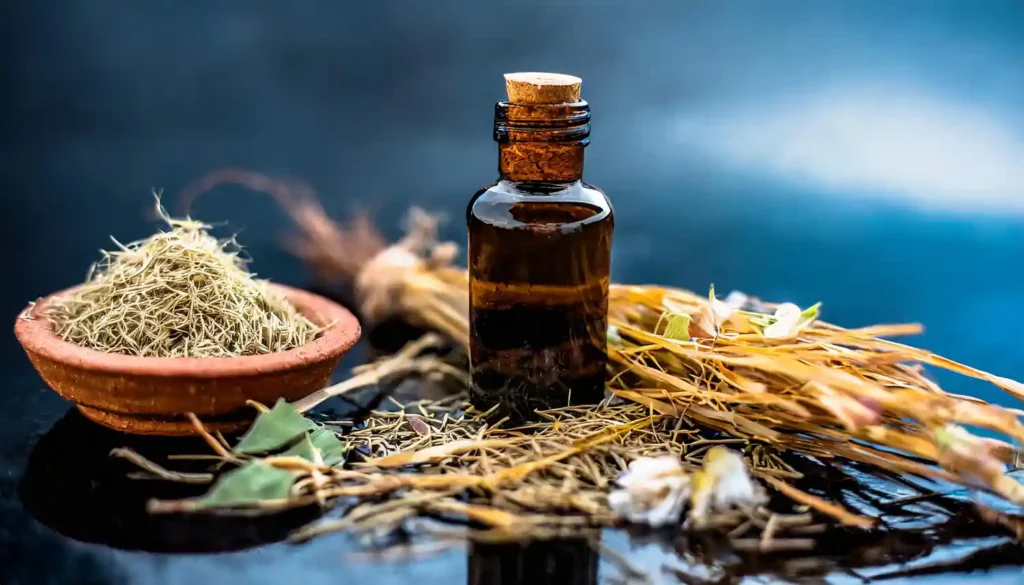
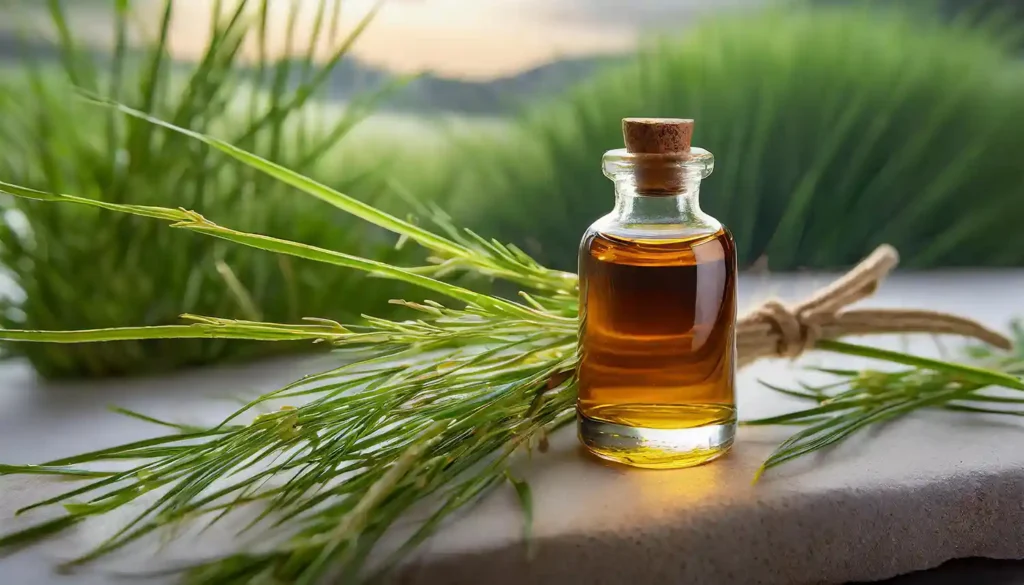
The Multifaceted Benefits of Vetiver Oil
With its rich, earthy scent and deep roots in traditional medicine, Vetiver essential oil offers many benefits for the mind and body. Its multifaceted properties make it a valuable addition to any wellness routine.
Soothing the Mind: Stress Relief and Sleep Improvement
Combatting Insomnia and Sleep Apnoea
Vetiver oil is renowned for its sedative properties, making it an excellent natural remedy for sleep disorders such as insomnia or disturbed sleep. Its calming scent helps regulate sleep patterns and promotes a more restful, uninterrupted night’s sleep.
Reducing Anxiety and Stress
The grounding aroma of Vetiver essential oil is particularly effective in managing stress and anxiety. It works by soothing the nervous system, reducing feelings of restlessness and bringing about a sense of calm and relaxation.
Skin and Hair Care Miracles
Treating Skin Conditions and Enhancing Skin Health
Vetiver oil is a boon for skin health thanks to its antiseptic and anti-inflammatory properties. It aids in treating various skin conditions such as acne, eczema, and psoriasis and promotes the natural healing of scars and marks, leading to clearer and healthier skin.
Natural Solutions for Hair Care and Dandruff Management
The oil’s nourishing properties also extend to hair care. It helps rejuvenate the scalp, reducing dandruff and strengthening hair follicles, promoting healthier, more lustrous hair.
Health and Healing Properties
Boosting Immunity and Healing Wounds
Vetiver oil’s antimicrobial and anti-inflammatory qualities make it effective in boosting the immune system and accelerating the healing of wounds and cuts. It may also help to reduce inflammation and provide relief from discomfort.
Natural Insect Repellent and Anti-inflammatory Agent
Besides its health benefits, Vetiver oil is a natural insect repellent that keeps mosquitoes and other pests away. Its anti-inflammatory properties also make it beneficial in blends for treating joint pain and muscle aches.
The diverse benefits of Vetiver essential oil, ranging from mental wellness to physical health, make it a versatile and invaluable natural remedy. Whether used in aromatherapy, topical applications or as part of daily skincare and haircare routines, Vetiver oil may significantly enhance overall well-being.
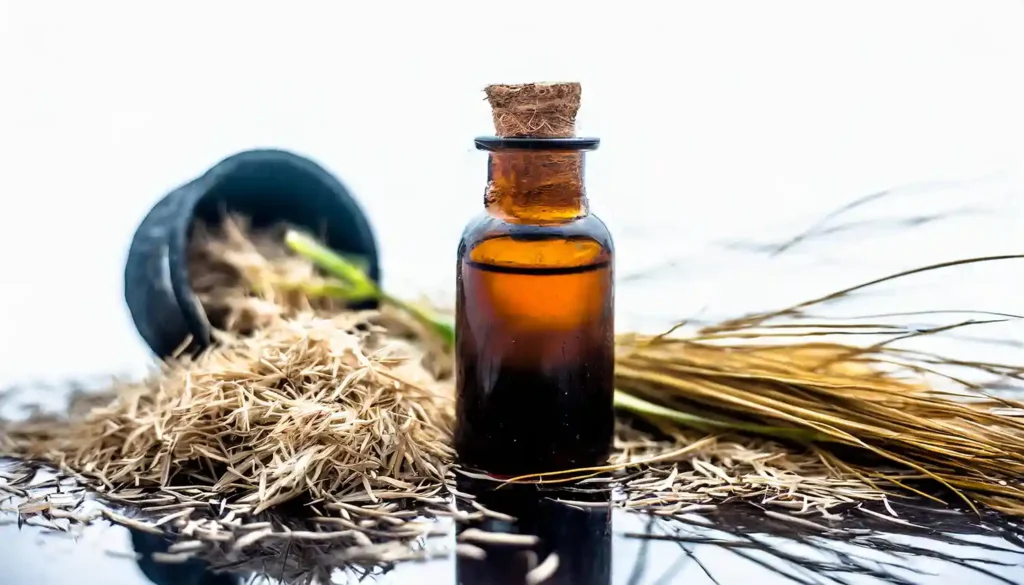
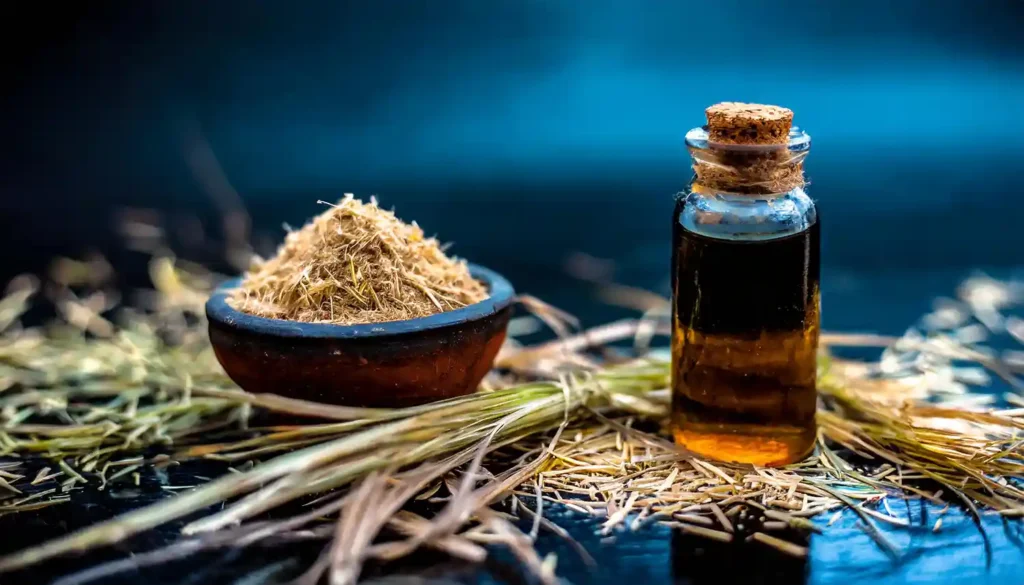
The Unique Aroma of Vetiver Oil
The aroma of Vetiver essential oil is as distinctive as its benefits. This deep, complex scent is often described as the essence of tranquillity and grounding, making it a cherished ingredient in perfumery and aromatherapy.
Describing the Scent Profile
Vetiver oil boasts a rich, earthy fragrance with smoky undertones. Its deep, woody notes are balanced with subtle hints of sweetness and a touch of citrus, creating a unique olfactory experience. This complex aroma profile makes Vetiver oil pleasing to the senses and highly effective in calming the mind and uplifting the spirit.
Uses in Aromatherapy and Perfumery
In aromatherapy, the grounding scent of vetiver oil is utilised to promote emotional balance and help alleviate stress and anxiety. Its soothing properties make it a popular choice for relaxation and meditation practices.
In perfumery, Vetiver’s distinctive scent is a prized base note, providing a long-lasting, earthy foundation upon which other fragrances are built. Its versatility allows it to blend well with various scents, from floral to citrus, making it a staple in many fragrance compositions.
The unique aroma of Vetiver essential oil is more than just a pleasant scent; it is a deeply calming scent that’s a journey into a world of calm and balance, making it a treasured addition to any aromatic collection.
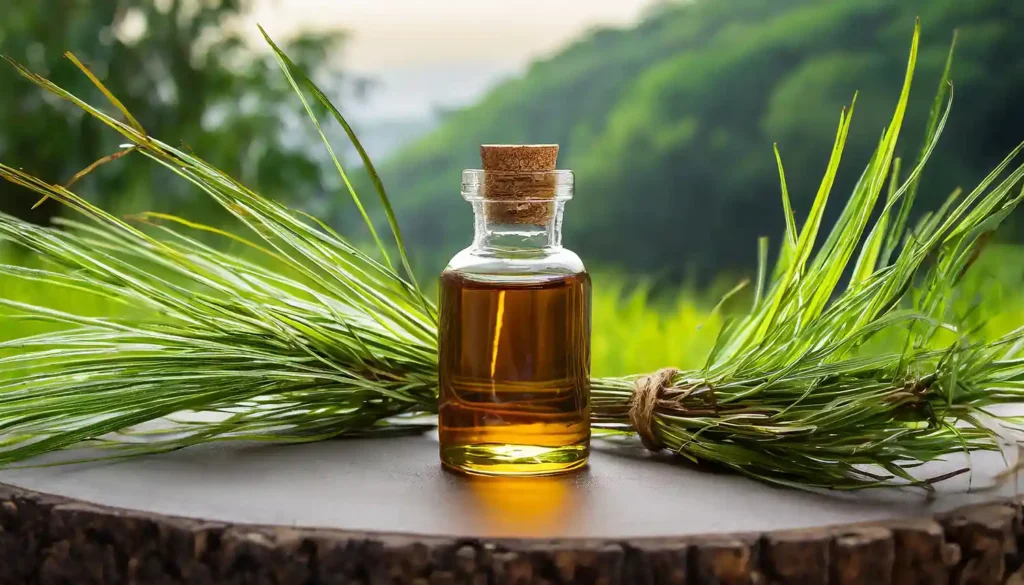
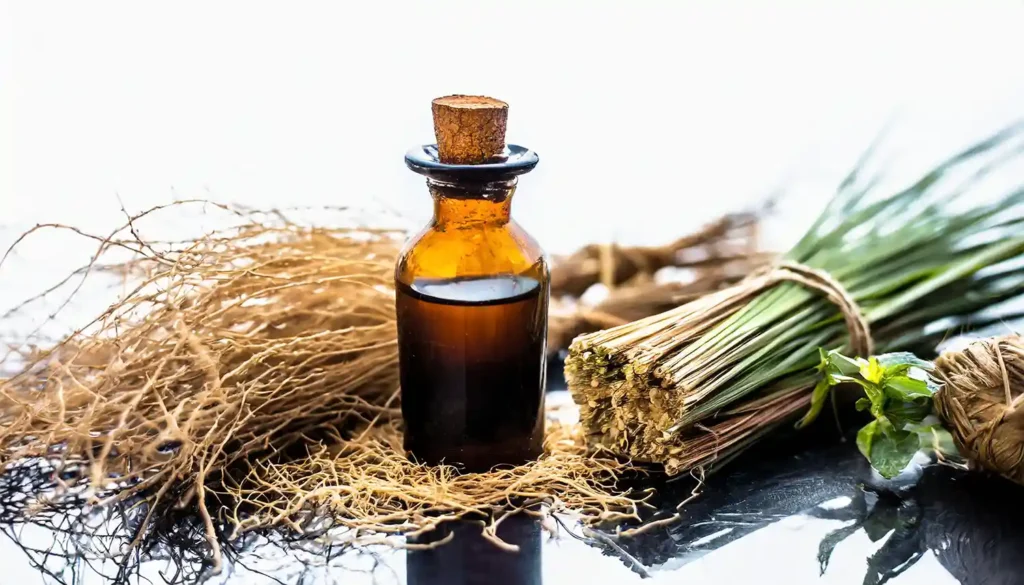
How to Use Vetiver Essential Oil
Vetiver essential oil’s versatility extends to its various applications. Whether used for its therapeutic properties or delightful aroma, understanding how to use Vetiver oil effectively can enhance its benefits.
Topical Applications and Dilution
Creating Your Own Vetiver Oil Blends
Vetiver oil can be blended with other essential oils for added benefits. For instance, mixing it with Lavender essential oil may enhance its stress-relieving properties, while combining it with Tea Tree oil may boost its effectiveness in skin care.
I’ve found the Vetiver blends particularly well with other woody oils, such as Sandalwood essential oil and Cedarwood essential oil – but be careful not to use too much Vetiver in your blends, as it quickly overwhelms the aroma of other oils.
Always use a carrier oil like Coconut, Sweet Almond, or Jojoba oil to dilute Vetiver oil before applying it to the skin.
Safe Practices for Topical Use
When using essential oils topically, conducting a patch test is important to ensure no allergic reaction. Apply a small amount of the diluted oil to a skin patch and wait 24 hours to check for any adverse reactions. Avoid using it on sensitive areas like near the eyes and inner ears.
Aromatherapy and Inhalation Methods
DIY Aromatherapy Formulations with Vetiver
Vetiver oil can be used in a diffuser to spread its calming aroma throughout your space. You can create your own aromatherapy blends by adding Vetiver oil with complementary scents like Sweet Orange or Neroli oil. This can help in creating a relaxing environment conducive to sleep or meditation.
When using a diffuser, follow the manufacturer’s instructions and use only one or two drops, as Vetiver’s strong scent can quickly overpower.
Best Practices for Inhalation and Diffusion
For inhalation, add a few drops of Vetiver oil to a bowl of hot water and breathe in the vapour. This method can be particularly effective for respiratory issues or to help calm the mind before sleep.
Inhaled vetiver essential oil can be an enriching experience for physical health and mental well-being or simply for enjoying its unique aroma. By understanding and applying these methods, you can safely and effectively incorporate the benefits of Vetiver oil into your daily routine.
Precautions and Side Effects
While Vetiver essential oil is generally considered safe and beneficial, it’s important to be aware of certain precautions and potential side effects to ensure its safe use.
Understanding the Risks
Vetiver oil is non-toxic, non-irritating, and non-sensitising for most individuals. However, like all essential oils, it is potent and should be used carefully. Overuse or improper dilution can lead to skin irritation or allergic reactions in some people. It’s crucial to always dilute Vetiver oil with a carrier oil before topical application and to conduct a patch test beforehand.
Recommendations for Sensitive Groups
Pregnant and nursing women should exercise caution when using Vetiver oil. While no direct evidence suggests it’s harmful during pregnancy or breastfeeding, it’s always best to consult with a Doctor or Professional Essential Oil Therapist before use.
Additionally, individuals with pre-existing health conditions, especially those related to the liver or kidneys, should seek medical advice before incorporating Vetiver oil into their regimen.
In summary, while Vetiver essential oil offers numerous benefits, it must be used responsibly. Being mindful of these precautions and consulting with healthcare professionals when necessary can help maximise the oil’s positive effects while minimising risks.
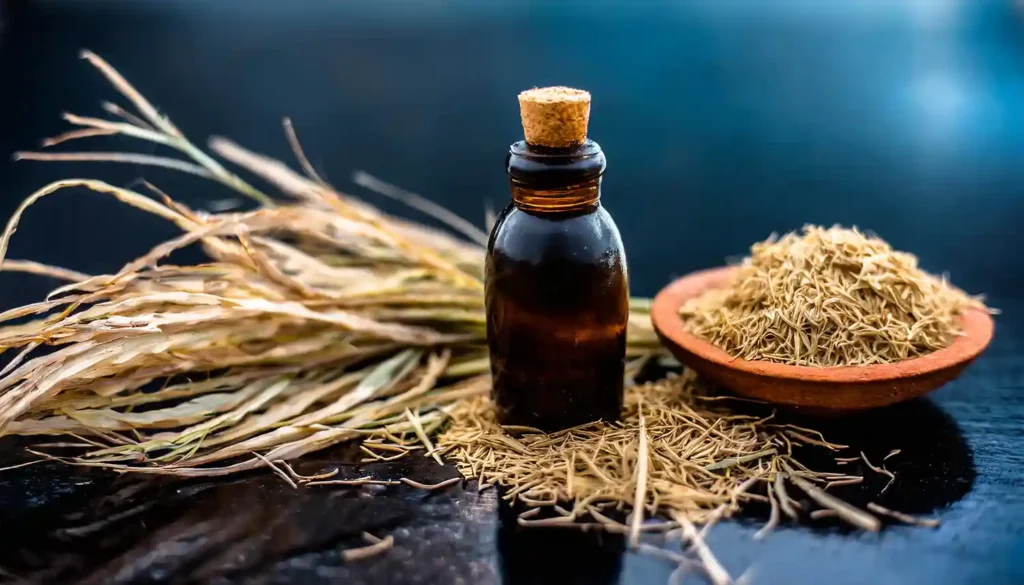
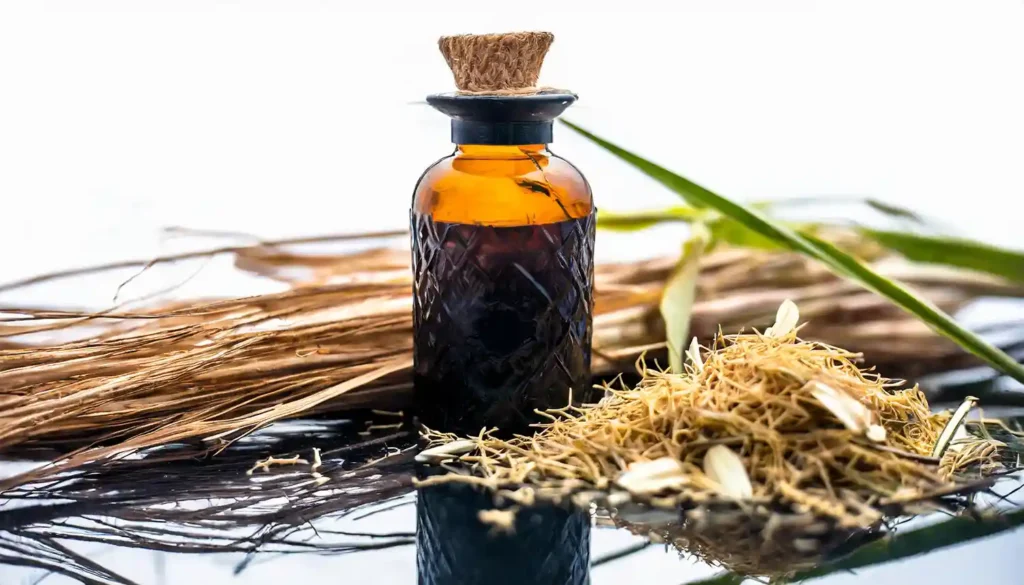
Frequently Asked Questions
What is vetiver oil good for?
Vetiver oil is acclaimed for its calming properties, making it effective in alleviating stress, anxiety, and sleep disorders like insomnia. Its antiseptic and anti-inflammatory qualities benefit skin care, helping conditions such as acne and eczema and aiding in scar healing.
In hair care, it promotes scalp health to help combat dandruff. Vetiver oil also boosts the immune system, serves as a natural insect repellent, and offers anti-inflammatory benefits for joint and muscle pain.
Its earthy aroma is used in aromatherapy for emotional balance and is a popular base note in perfumery, highlighting its versatility in wellness applications.
What does vetiver oil smell like?
Vetiver oil has a distinctive, complex aroma often described as deep and earthy with a slightly smoky undertone. This rich fragrance is balanced with subtle hints of sweetness and a touch of citrus, adding layers to its overall scent profile.
The aroma is grounding and calming, making it a favourite in aromatherapy for its soothing qualities. Its unique and robust fragrance also makes Vetiver oil a popular base note in many perfumes and colognes, valued for its long-lasting and evocative scent.
Is vetiver good for anxiety?
Vetiver oil is highly regarded for its ability to alleviate anxiety. Its grounding and calming properties make it an excellent choice for those seeking natural anxiety relief. The oil’s deep, complex aroma has a soothing effect on the mind, helping to reduce feelings of stress and nervousness.
In aromatherapy, Vetiver oil is often used to promote relaxation and emotional balance, making it beneficial for individuals dealing with anxiety. Its sedative qualities can also aid in improving sleep, which is often disrupted by stress.
Overall, Vetiver oil is a valuable natural remedy for managing and reducing symptoms of anxiety.
Can you put Vetiver oil on the skin?
Yes, Vetiver oil can be applied to the skin, but it should be done carefully. Like most essential oils, Vetiver oil is potent and should be diluted with carrier oils, such as Almond or Coconut oil, before topical application. This dilution helps prevent skin irritation or allergic reactions.
It’s also advisable to perform a patch test first, applying a small amount of the diluted pure vetiver oil onto a patch of skin and waiting to see if there’s any adverse reaction. Vetiver oil is known for its skin benefits and soothing and healing properties, making it a popular choice in skincare routines.
Where do you apply vetiver essential oil?
Vetiver essential oil can be applied to various parts of the body, depending on the intended use. It can be applied to pulse points like the wrists, temples, or behind the ears for relaxation and stress relief.
When used for skincare, it can be applied directly to affected areas, such as spots of acne or inflammation, ensuring it’s appropriately diluted with a carrier oil. It’s important to avoid sensitive areas like the eyes and inner ears and to conduct a patch test before widespread use.
When diluted, applying it to the soles of the feet or diffusing it in the bedroom can be effective for aiding sleep.
Where do you put vetiver oil for sleep?
Vetiver oil can be used in a few effective ways to aid sleep.
Applying the oil to the soles of the feet before bedtime is a popular method, as the soles are less sensitive and absorb the oil well. Applying a diluted mixture of Vetiver oil to pulse points such as the wrists, temples, or behind the ears can also be beneficial.
Another effective approach is using Vetiver oil in a diffuser in the bedroom to create a calming atmosphere conducive to sleep. Vetiver’s soothing and grounding aroma helps promote relaxation and can significantly improve sleep quality.
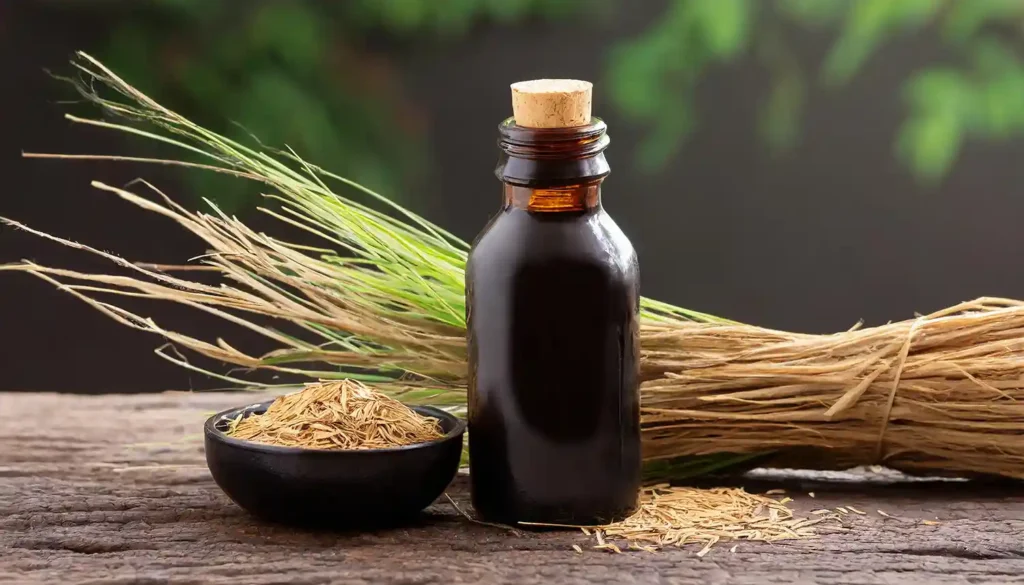
Final Thoughts: Embracing the Essence of Vetiver
With its complex aroma and many health benefits, Vetiver essential oil is a remarkable gift from nature. Its versatility in application and effectiveness in addressing various physical and emotional issues make it a valuable addition to anyone’s wellness toolkit. Its ability to soothe the mind, rejuvenate the body, and uplift the spirit aligns perfectly with the principles of holistic health.
In conclusion, the unique properties of Vetiver oil make it an indispensable ally in today’s fast-paced and often stressful world. Its grounding effect is a natural antidote to the anxieties and pressures of modern life. Moreover, its benefits in skin and hair care and its therapeutic effects on the mind and body underscore its versatility and efficacy.





